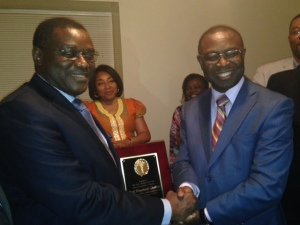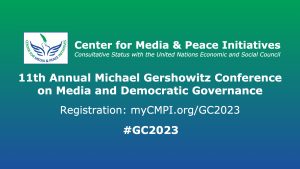Social media correspondent Lauren Parks met with Nicholas Kristof, a New York Times Pulitzer-winning journalist to discuss his work and proposed Africa Roundtable of Center for Media & Peace Initiatives.

New York Times Pulitzer-winning journalist, Nicholas Kristof says the media should be solution providers by serving as the eyes for the world and providing platforms for citizen engagement in confronting social problems.
Kristof spoke with CMPI social media correspondent in New York at the preview of Half the Sky, documentary adapted from a book with the same title.
In the preview event of “Half the Sky” the panel which included Nicholas Kristoff and his wife Sheryl Wudunn (co-author of Half the Sky) and Hollywood intellectual star Olivia Wilde, discussed micro-savings in Kenya and its impact on women’s economic status, the child prostitution in Madhya Pradesh in India, and the importance of providing an informed education for boys and girls.
Mr. Kristof explained that “Half the Sky” was an attempt to put media conventions in a bottle by re-writing opinion journalism in his brave stance on many social issues off shore and on shore.
From two of our most fiercely moral voices, a passionate call to arms against our era’s most pervasive human rights violation: the oppression of women and girls in the developing world.
With Pulitzer Prize winners Nicholas D. Kristof and Sheryl WuDunn as our guides,
The couple uses the book to undertake an odyssey through Africa and Asia to meet the extraordinary women struggling there, among them a Cambodian teenager sold into sex slavery and an Ethiopian woman who suffered devastating injuries in childbirth. Drawing on the breadth of their combined reporting experience, Kristof and WuDunn depict our world with anger, sadness, clarity, and, ultimately, hope.
They show how a little help can transform the lives of women and girls abroad. That Cambodian girl eventually escaped from her brothel and, with assistance from an aid group, built a thriving retail business that supports her family. The Ethiopian woman had her injuries repaired and in time became a surgeon. A Zimbabwean mother of five, counseled to return to school, earned her doctorate and became an expert on AIDS.
Through these stories, Kristof and WuDunn help us see that the key to economic progress lies in unleashing women’s potential. They make clear how so many people have helped to do just that, and how we can each do our part. Throughout much of the world, the greatest unexploited economic resource is the female half of the population. Countries such as China have prospered precisely because they emancipated women and brought them into the formal economy. Unleashing that process globally is not only the right thing to do; it’s also the best strategy for fighting poverty.






